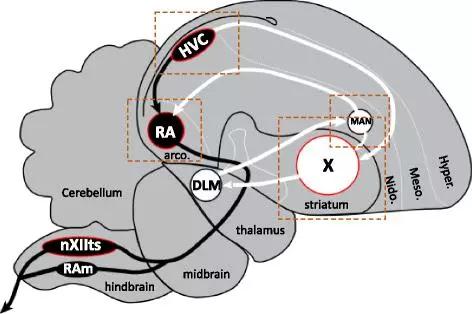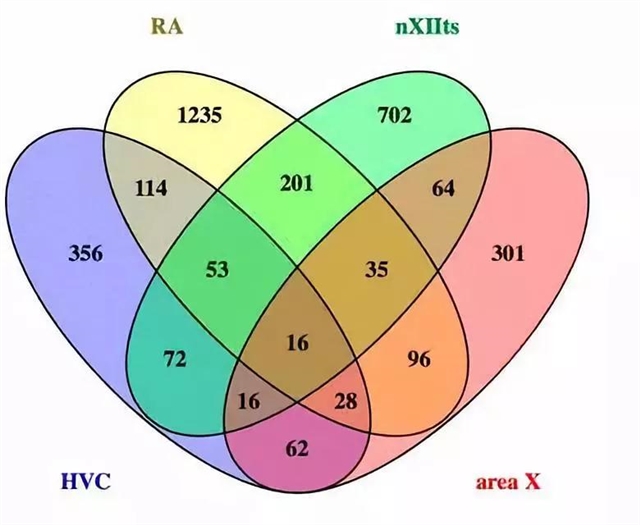|
|
|
|
|
“唱歌”学得好不好?基因说了算 | BMC Genomics |
|
|
论文标题:The constitutive differential transcriptome of a brain circuit for vocal learning
期刊:BMC Genomics
作者:Peter V. Lovell, Nicole A. Huizinga, Samantha R. Friedrich, Morgan Wirthlin and Claudio V. Mello
发表时间:2018/04/03
数字识别码:10.1186/s12864-018-4578-0
原文链接:https://bmcgenomics.biomedcentral.com/articles/10.1186/s12864-018-4578-0?utm_source=other&utm_medium=other&utm_content=null&utm_campaign=BSCN_2_DD_Article_Sciencenet
微信链接:https://mp.weixin.qq.com/s/D4jU_76NO2R0tk8yhxNz6Q
声乐学习,即模仿他人发声的能力,是人类口语习得的基础。它是一种相对罕见的特性,目前认为是从少数哺乳动物群(如鲸目动物、蝙蝠)和三种鸟类(蜂鸟、鹦鹉、鸣禽)中进化而来的。
近期发表在BMC Genomics上的一项研究揭示了斑胸草雀(Taeniopygia guttata)脑核的鸣声控制系统基因差异化的表达及其与声音模仿能力的关联。
斑胸草雀(也常被称为珍珠鸟或斑马雀)是典型的鸣禽物种,对斑胸草雀进行最深入的研究发现:习得、记忆和产生声音需要一组专门脑核的协调活动,这些脑核统称为声音控制系统。几十年的深入研究揭示了在声乐学习和歌曲创作的背景下,这些脑核(统称为鸣声控制系统)的组织、连接和生理特性。

斑胸草雀,Taeniopygia guttata。
斑胸草雀的鸣声控制系统是由成两个截然不同但相互连接的通路所构成的,包括直接声动通路(DMP;图1:黑核和投影,)这是歌曲的产生所必需的,和前脑通路(AFP;图1:白核和投影),它们是产生歌曲和实现成年人的发声可塑性所必需的。在成年人中,损害DMP的脑核会导致歌唱中断,而微刺激可根据被刺激的大脑水平诱发呼叫或歌唱。在歌曲学习期间,对这些脑核的损伤会阻止成人对歌曲的学习。

图2. 斑胸草雀声乐学习和歌唱的主要大脑区域(本文中分析的区域用红色标出)
之前已经有研究揭示了在这些发声脑核中部分表达的基因,但是仍然缺少对这个系统的转录特征的全面描述。为了弥补这方面的空缺,来自Oregon Health and Sciences University的研究团队对斑胸草雀声乐控制系统中DMP的组分(即HVC,RA和nXIIts)以及AFP的X区域进行了彻底的转录组学分析,并与成年雄性中相邻脑区的基因表达进行对比。鉴定出了斑胸草雀脑核中组成型表达的生物标记物。

图3. 受到HVC,RA,nXIIts和X区差异化调节的生物标记物基因数目的韦恩图
研究人员分析了之前用于识别唱歌调节基因的微阵列数据(www.zebrafinchatlas.org)、鸟类和人类中发声脑核的特异性以及HVC的分子特征。此外,还分析了380个基因的原位杂交数据,这不仅极大地扩展了分析的范围,而且使研究者有机会评估未经微阵列分析的脑核的表达情况。重要的是,与以往研究的不同之处在于,本文章的研究者专注于识别在安静,非唱歌的鸟类的歌曲系统中组成型表达基因的情况,从而排除了歌唱诱导表达带来的混淆。同时还对微阵列进行了严格和广泛的注释工作,并使用原位杂交模式独立地建立每个脑核中差异表达的高置信度截止值,分析未通过微阵列分析的脑核中的表达情况。同时还对与声音系统的发育和生理学相关的特定基因家族进行了深入的分析,包括检查未在微阵列上取样的许多高度相关基因的原位杂交模式。在成年雄性鸟类中,研究人员最终确定了超过3300个基因,与相邻脑区的情况不同,这些基因在一个或多个声乐脑核中受到了差异化地调控。
此外,研究者还通过生物信息学分析揭示了这些基因可能参与分子通路调控的机制:如细胞形态发生,内在细胞兴奋性,神经传递和神经调节,轴突介导和细胞间相互作用以及细胞存活等等。这些发现对现有脊椎动物中涉及到促进声乐学习行为脑回路的生物标记物进行了详细的阐述,并且对大脑声音控制回路中可能起作用的的功能性分子提供了新的见解。
摘要:
Background
The ability to imitate the vocalizations of other organisms, a trait known as vocal learning, is shared by only a few organisms, including humans, where it subserves the acquisition of speech and language, and 3 groups of birds. In songbirds, vocal learning requires the coordinated activity of a set of specialized brain nuclei referred to as the song control system. Recent efforts have revealed some of the genes that are expressed in these vocal nuclei, however a thorough characterization of the transcriptional specializations of this system is still missing. We conducted a rigorous and comprehensive analysis of microarrays, and conducted a separate analysis of 380 genes by in situ hybridizations in order to identify molecular specializations of the major nuclei of the song system of zebra finches (Taeniopygia guttata), a songbird species.
Results
Our efforts identified more than 3300 genes that are differentially regulated in one or more vocal nuclei of adult male birds compared to the adjacent brain regions. Bioinformatics analyses provided insights into the possible involvement of these genes in molecular pathways such as cellular morphogenesis, intrinsic cellular excitability, neurotransmission and neuromodulation, axonal guidance and cela-to-cell interactions, and cell survival, which are known to strongly influence the functional properties of the song system. Moreover, an in-depth analysis of specific gene families with known involvement in regulating the development and physiological properties of neuronal circuits provides further insights into possible modulators of the song system.
Conclusion
Our study represents one of the most comprehensive molecular characterizations of a brain circuit that evolved to facilitate a learned behavior in a vertebrate. The data provide novel insights into possible molecular determinants of the functional properties of the song control circuitry. It also provides lists of compelling targets for pharmacological and genetic manipulations to elucidate the molecular regulation of song behavior and vocal learning.
阅读论文全文请访问:
https://bmcgenomics.biomedcentral.com/articles/10.1186/s12864-018-4578-0?utm_source=other&utm_medium=other&utm_content=null&utm_campaign=BSCN_2_DD_Article_Sciencenet
期刊介绍:
BMC Genomics (https://bmcgenomics.biomedcentral.com/, 3.730 - 2-year Impact Factor, 4.257 - 5-year Impact Factor ) is an open access, peer-reviewed journal that considers articles on all aspects of genome-scale analysis, functional genomics, and proteomics.
(来源:科学网)
特别声明:本文转载仅仅是出于传播信息的需要,并不意味着代表本网站观点或证实其内容的真实性;如其他媒体、网站或个人从本网站转载使用,须保留本网站注明的“来源”,并自负版权等法律责任;作者如果不希望被转载或者联系转载稿费等事宜,请与我们接洽。